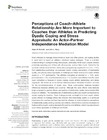| dc.description.abstract | Most attempts to manage stress involve at least one other person, yet coping studies in sport tend to report an athlete’s individual coping strategies. There is a limited understanding of coping involving other people, particularly within sport, despite athletes potentially spending a lot of time with other people, such as their coach. Guided by the systemic-transactional model of stress and coping among couples (Bodenmann, 1995), from relationship psychology, we assessed dyadic coping, perceptions of relationship
quality, and primary stress appraisals of challenge and threat among 158 coach–athlete dyads (n D 277 participants). The athletes competed at amateur (n D 123), semiprofessional (n D 31), or professional levels (n D 4). Coaches and athletes from the same dyad completed a measure of dyadic coping, coach–athlete relationship, and stress appraisals. We tested an Actor–Partner Interdependence Mediation Model to account for the non-independence of dyadic data. These actor–partner analyses revealed
differences between athletes and coaches. Although the actor effects were relatively large compared to partner effects, perceptions of relationship quality demonstrated little impact on athletes. The mediating role of relationship quality was broadly as important as dyadic coping for coaches. These findings provide an insight in to how coach–athlete dyads interact to manage stress and indicate that relationship quality is of particular importance for coaches, but less important for athletes. In order to improve perceptions of relationship quality among coaches and athletes, interventions could be developed to foster positive dyadic coping among both coaches and athletes, which may also impact upon stress appraisals of challenge and threat. | en_US |


